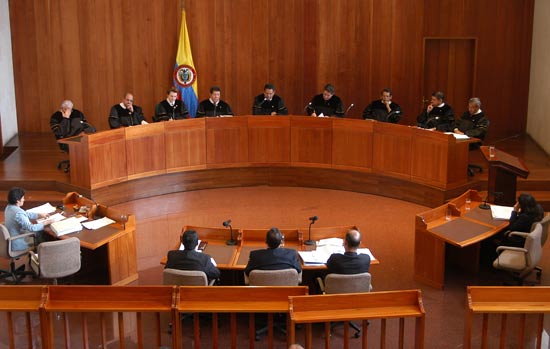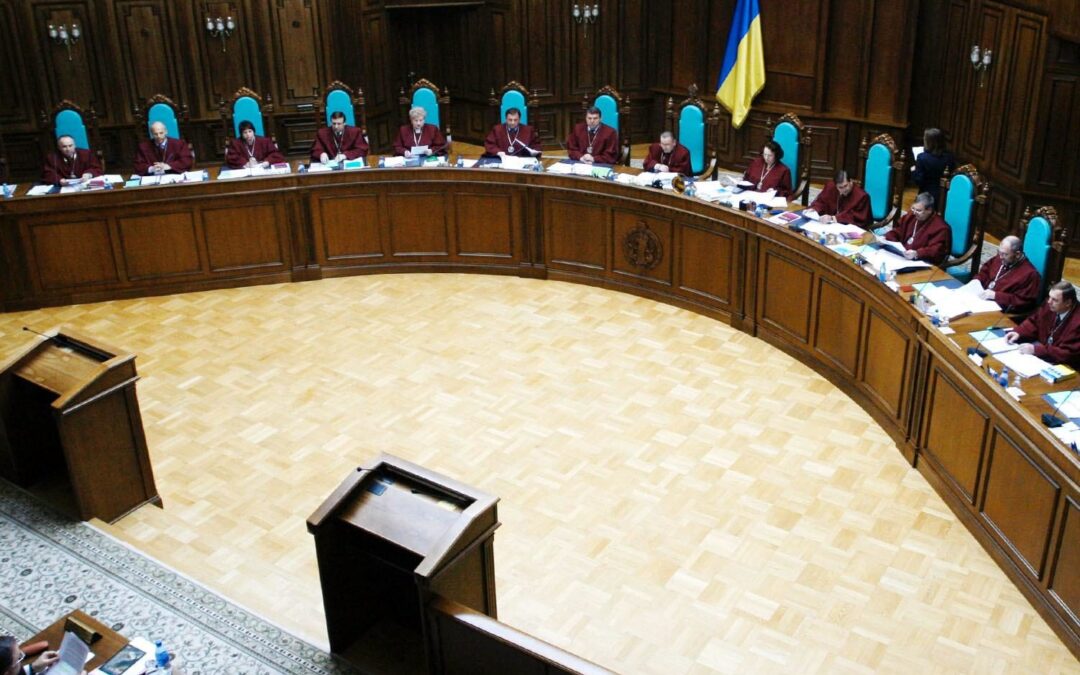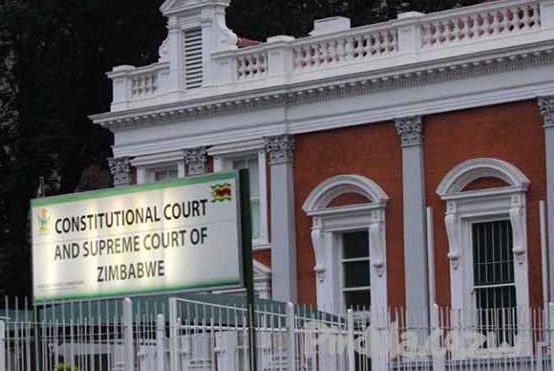
Mar 11, 2022 | News
Today, the Colombian Commission of Jurists (CCJ) and the International Commission of Jurists (ICJ) call upon the Government to respect the judicial independence of the Constitutional Court and take appropriate measures to guarantee the safety, security, and integrity of Constitutional Court’s justices from threats against them.

Nov 16, 2020 | Advocacy, News
Today, the ICJ calls on the Ukrainian authorities to abandon a draft law which would dismiss the judges of the Constitutional Court of Ukraine, as a means of retaliation for a decision adopted by the Court and in order to circumvent the decision.
The authorities should also refrain from any other actions, including harassment of judges, which undermine the independence of the Constitutional Court.
“This draft law constitutes a direct attack on the ability of the judiciary to exercise its functions independently. It is incompatible with basic principles of the rule of law and the separation of powers, and with international standards on the independence of the judiciary,” said Róisín Pillay, Director of the ICJ Europe and Central Asia Programme.
“By the nature of their role, the judiciary, and especially constitutional courts may be required to decide on controversial matters. It is however essential that particularly in such cases, courts are able to operate without fear of retaliation or repression for the decisions they take,” she added.
The draft law on Restoring Public Confidence in the Constitutional Court, submitted by President Zelensky to the Ukrainian Parliament (Verkhovna Rada), aims to pronounce a decision of the Constitutional Court on anti-corruption legislation “void” and without legal consequences.
This runs contrary to the Ukrainian Constitution according to which “[d]ecisions and opinions adopted by the Constitutional Court of Ukraine shall be binding, final and may not be challenged” (Article 151-2).
The draft law would terminate the mandate of the judges of the Constitutional Court, in contravention of the Constitution of Ukraine as well as basic principles of independence of the judiciary, governing appointments, dismissal and security of tenure of judges.
The draft law provides that the powers of the Constitutional Court of Ukraine in force at the time of the decision on the anti-corruption law would be terminated from the date of entry into force of the law.
According to the explanatory note to the Draft Law, one reason the adoption of the law would be justified is because there had not been a “proper substantiation” of its judgment on the anti-corruption law. The note alleges that Court’s decision was adopted in the private interests of judges of the Constitutional Court of Ukraine, that its proper substantiation was not provided and that it contradicts the principle of the rule of law and denies the European and Euro-Atlantic choice of the Ukrainian people. The ICJ considers these allegations are inappropriate as they directly interfere with the judicial function of the Constitutional Court of Ukraine, contrary to the national legislation and international law on the independence of the judiciary.
On 2 November 2020, Oleksandr Tupitsky, the President of the Constitutional Court was summoned for interrogation by the State Investigation Bureau in connection with allegations against him of committing crimes as part of an organized group. The ICJ fears that this may be a form of pressure in relation to the Constitution Court’s decision.
Following these incidents, the Constitutional Court has stopped working as four of the judges refuse to take part in its sessions. The Court therefore lacks the necessary quorum to operate.
The ICJ calls on Ukraine to withdraw the draft law, and to refrain from any further reprisals against judges for their decisions.
Download
Ukraine-draft law constitutional court-News-ENG-2020 (full statement with background information)

Apr 2, 2020 | News
The ICJ welcomes the decision by the Constitutional Court of Zimbabwe to invalidate the enactment of Constitutional Amendment Bill (No. 1) of 2017 in Gonese and Anor v Parliament of Zimbabwe and 4 Ors. The judgment restores important Constitutional guarantees for the independence of the judiciary in Zimbabwe.
Zimbabwe adopted a new Constitution in 2013 and one of the progressive elements of this Constitution was its provisions regulating the appointment of judicial leaders such as the Chief Justice, Deputy Chief Justice and Judge President of the High Court. These judicial leaders perform important administrative functions with a huge impact on access to justice for the public.
For example, the Chief Justice is the head of the Judicial Service Commission (JSC) and therefore, presides over processes to select and recommend candidates for judicial appointment.
The Judge President is responsible for case allocation in the High Court and therefore, selects judges to sit on cases. It is important that the procedures for appointing these judicial leaders be transparent and independent of executive control in order to maintain the independence and impartiality of judges as well as promote public confidence in the judiciary.
The 2013 Constitution ensured this by prescribing procedures which accorded the executive a constrained role in the selection and appointment of these judicial leaders.
For example, the process of selecting these office bearers was to be led by an independent Judicial Service Commission (JSC) which would publicly advertise the vacancies, shortlist candidates, conduct interviews that are open to the public and recommend candidates for appointment by the President. The President was required to appoint only from the shortlist submitted by the JSC.
In 2017, the then-President of Zimbabwe Robert Mugabe signed into law a constitutional amendment bill which sought to change these provisions and give the President the authority to select and appoint these judicial leaders without conducting public interviews and without being constrained or restricted to the shortlist provided by the JSC.
The enactment of this constitutional amendment bill was challenged in the Constitutional Court on grounds that the amendment had been adopted and enacted into law without following due process.
In its judgment, the Constitutional Court concluded that, “It is declared that the passing of Constitutional Amendment Bill (No. 1) of 2017 by the Senate on 01 August 2017 was inconsistent with the provisions of s 328(5) of the Constitution, to the extent that the affirmative votes did not reach the minimum threshold of two-thirds of the membership of the House. Constitutional Amendment Bill (No. 1) of 2017 is declared invalid to the extent of the inconsistency. The declaration of invalidity shall have effect from the date of this order but is suspended for a period of one hundred and eighty days, subject to the provisions of paragraph 1(b).”
The Court directed the Senate to conduct a vote in accordance with the procedure for amending the Constitution prescribed by s 328(5) of the Constitution within one hundred and eighty days of the order given. Failure to do so will render the declaration of invalidity of Constitutional Amendment Bill (No. 1) of 2017 final, said the Court.
Commenting on this judgment, ICJ Africa Director Arnold Tsunga said: “This is a positive judgment which underscores the vital principle of legality, particularly that changes to the Constitution must be processed and enacted in strict accordance with the laid out procedures. Respect for the Constitution, and ensuring the independence of the judiciary, are fundamental elements of the rule of law; both are advanced by this judgment.”
The decision by the Constitutional Court comes at a time when the Parliament of Zimbabwe has gazetted further proposed changes to the Constitution, which amongst other things seek to give the executive a stronger role in the selection and appointment of judges to the Supreme Court and Constitutional Court.
These proposed changes would undermine judicial independence and undercut public confidence in the independence and impartiality of the judiciary. Further, these proposed changes are contrary to international and African standards. For instance, the United Nations Basic Principles on the Independence of the Judiciary enjoin member states to ensure that “Any method of judicial selection shall safeguard against judicial appointments for improper motives.”
The African Commission on Human and Peoples’ Rights’ Principles and Guidelines on the Right to a Fair Trial and Legal Assistance in Africa further provide that, “The process for appointments to judicial bodies shall be transparent and accountable and the establishment of an independent body for this purpose is encouraged.” The ICJ therefore, calls upon the government of Zimbabwe to reconsider its decision to proceed with these proposed changes to the Constitution.
Contact
Arnold Tsunga, t: +26377728 3248; e: arnold.tsunga@icj.org

Jul 22, 2018 | News
The Supreme Court’s election of a person who is not suitable for the position of substitute judge on the Constitutional Court is deeply concerning for the sound administration of justice and the effective application of the rule of law, the ICJ said today.
Ramon Cadena, the Director of the Central American office of the ICJ added: “with this election, the SCJ has contributed to deepening the crisis in the judicial system and it will affect the little credibility that the Guatemalan people still retain in the justice system.”
The position of substitute judge on the Constitutional Court (CC) had become vacant when the former substitute judge was appointed Attorney General by the President, Jimmy Morales.
The eight judges of the SCJ who voted in favour of the substitute judge of the CC did not comply with international norms and standards on the administration of justice.
The Basic Principles on the Independence of the Judiciary state that “Persons selected for judicial office shall be individuals of integrity and ability with appropriate training or qualifications in law.”
The ICJ has been able to verify that the SCJ judges elected a person who:
- in 2010 was dismissed as Attorney General by the CC shortly after assuming office because the person was deemed not suitable;
- openly opposes the International Commission against Corruption and Impunity (ICCIG) despite the good work that the Commission undertakes to address corruption and impunity;
- in 2010, after assuming the office of Attorney General was accused of intervening in cases concerning corruption and impunity and impairing evidence in these cases.
The ICJ recalls that the CC stated that the acts carried out by Congress on 11 September 2017 were susceptible of causing “irreparable harm to the justice system”.
The ICJ considers that the election by the SCJ of the substitute judge to the CC should also be considered an act of irreparable harm to the justice system.
The ICJ therefore urges the CC to once again protect the rule of law in Guatemala.







